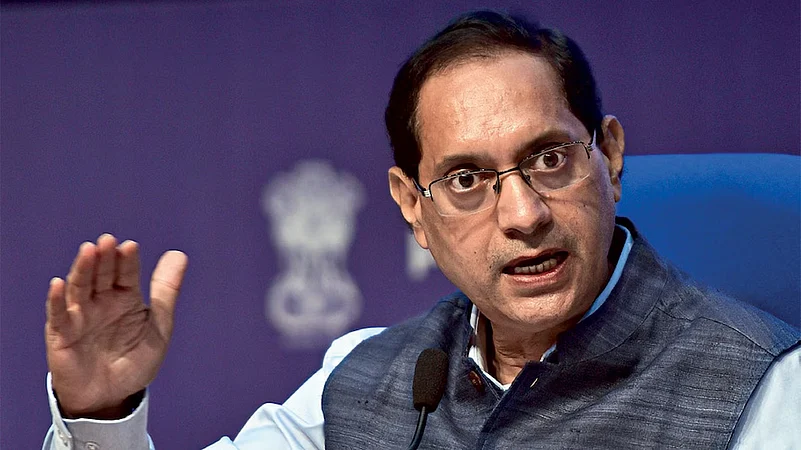Returns from disinvestment will inevitably decrease, if earnings of state-owned companies are lacking, and therefore, focus should be more towards the contribution of dividends in fiscal consolidation, said Tuhin Kanta Pandey, Secretary of Department of Investment and Public Asset Management (DIPAM).
In an interview with Outlook Business, Pandey said there has not been enough discussion upon how dividends from public-sector companies have supported the reduction in fiscal deficit. “In recent years, especially the last couple, there have been several reports about dividends. Previously, this money was not even counted, but for some, Rs 10,000 crore (100 billion) from disinvestment is considered more significant than Rs 60,000 crore (600 billion) in dividends,” he said.
Finance Minister Nirmala Sitharaman in her presentation of the Union Budget for 2024-25 further lowered the fiscal deficit target to 4.9 per cent of the gross domestic product (GDP), from the previous estimate of 5.1 per cent, pegged in the Interim Budget.
Apart from the government’s new approach to disinvestment, Pandey also shared his views on the social aspects of privatising a public-sector organisation, using the case of Air India as an example.
Edited Excerpts:
What gives you confidence in this new approach to disinvestment, and will it be a definitive feature in future budgets as well?
The stock market is influenced by numerous external and internal events, and we are discussing averages here. One cannot judge a company's value based on today's stock price because that value does not change overnight due to temporary market events. However, over time, stock prices tend to reflect a company's potential returns, incorporating various pieces of information.
Typically, earnings, the bottom line, the top line, return on equity, and other financial metrics are crucial factors. These should be equally considered by public sector management, government nominee directors, and the relevant ministries.
Our approach is to adopt a public asset management strategy, assessing our assets and acting accordingly. As market players, we must operate in a manner consistent with market principles. Fiscally, resources will come in, but the typical target approach should not be directly tied to fiscal deficits.
If not relying on disinvestment receipts, to what extent are you depending on dividends for fiscal consolidation?
If you look at it, the non-tax revenue is about Rs 5.45 lakh crore, which has grown by about Rs 1.5 lakh crore this year. The actuals were more than Rs 1 lakh crore above the budget estimates (BE). The BE was Rs 3 lakh crore for non-tax revenue, but the provisional actuals are Rs 4 lakh crore, and the budget for this year is Rs 5.45 lakh crore.
Now, of course, this includes a significant contribution from the RBI (Reserve Bank of India), but it is not only the RBI dividend. Dividends from CPSEs (Central Public Sector Enterprises) have increased, and banks and insurance companies have also started contributing dividends. Previously, banks were receiving handouts in terms of recapitalisation. Now, as their financial situation has improved, their earnings have increased, allowing them to pay dividends, subject to their own capital needs.
Dividends were not even a topic of discussion previously. We have now started focusing on them and have begun displaying dividend information on our website as soon as it is received. In recent years, especially the last couple, there have been several reports about dividends. Previously, this money was not even counted, but for some, Rs 10,000 crore from disinvestment is considered more significant than Rs 60,000 crore in dividends.
I believe there has been a prevailing narrative for the past 15 years that disinvestment is the key solution to the fiscal deficit. Dividends were not even considered or discussed. However, if earnings are lacking, the returns from disinvestment will inevitably decrease.
What cues are you taking from the current disinvestment of IDBI Bank? There is a conception that this would pave way for further disinvestment in the banking sector.
I would not necessarily link it to anything else. I would simply say that the disinvestment of IDBI Bank is proceeding. Technically, it is classified as a private bank in the RBI's books due to its majority ownership by LIC. Our plan is to exit at the appropriate time, while retaining interests for both LIC and the government. The RBI has taken some time, and they likely have their reasons, as they are the regulator. I cannot comment on their specific needs or decisions.
The process is also unique because it involves selling equity in a bank through a public auction via a bidding route, which has never been done before. Previously, such changes occurred due to distressed banks where the RBI used its extraordinary powers to find a rescuer. In contrast, we are now discovering the value of a perfectly healthy bank through a bidding process for its shares. This process is being conducted with the regulator's approval and with the transaction structure in the public domain. We have issued a global invite based on this structure. This is a first for both us and the RBI, and they are now in advanced stages. I am hopeful for its conclusion this year.
RBI had proposed a guideline for lenders to increase their provisions 12 times for infrastructure loans, after which the stocks of some public-sector banks took a hit. In case these get implemented, will it put your bank disinvestment plans on hold?
I think this is currently under discussion, and the banks have provided their comments. The RBI considers macroeconomic stability and other issues, which is the regulator's responsibility. After further discussion, these matters may be suitably resolved.
Considering what happened in the case of Air India’s privatisation, how much of consideration you are putting into the political and social aspects of these takeovers?
Shifting from a public sector culture to a private sector environment can create apprehension among employees. They may feel uncertain about how they will be treated in the private sector, and while the change could be beneficial, it is natural for them to feel uneasy about the transition.
This issue does exist, but the courts, including the Supreme Court in the Balko case, have ruled that it is not really the employee's choice to select their employer. In this context, the work being done is not a sovereign duty like military service or tax collection; it is business.
In business, the government functions like an ordinary shareholder. The courts have ruled that employees cannot dictate terms or conditions, similar to how ordinary shareholders cannot influence such decisions.
In the case of Air India, there was significant initial resistance. Employees had to understand that the airline could not even pay their salaries without government assistance, which ultimately comes from taxpayers. The question arises: why should taxpayers fund an unprofitable enterprise? Air India was unable to grow, with planes being cannibalised for parts, leading to grounded aircraft and declining service quality. This is unsustainable for a service-oriented organisation that requires high standards.
Currently, Air India is being managed differently. Although no business transformation is easy, rebuilding a business that has been in decline for years will take time. This includes acquiring new, fuel-efficient planes, which cannot be done overnight and will take several years. However, efforts are underway, and progress is being made, including mergers and other strategic initiatives.
Therefore, privatisation can, in various situations, yield significant benefits. However, it must be evaluated on a case-by-case basis to determine its effectiveness. Overall, I would say capital in the country should be put to good use and not be a waste.




























